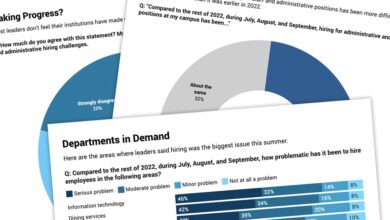Following Colleague’s Comments on Racism, ‘JAMA’ Editor’s Resignation Came With $500,000 Payout

[ad_1]
The fallout from a Journal of the American Medical Association deputy editor’s 2021 remarks on systemic racism resulted in a nearly half-million-dollar behind-the-scenes payout to JAMA‘s then-editor in chief, who resigned following the incident.
The episode sparked broader discussion of the alleged failures of the American Medical Association and its academic journals to confront structural racism internally and in wider society. Edward Livingston, the deputy editor, made the comments on a JAMA podcast that was subsequently promoted by the journal’s Twitter account, eventually spurring an investigation by the AMA. In accordance with standard investigative practice, the AMA placed Howard Bauchner, then JAMA’s top editor, on administrative leave in late March 2021. Come June, the AMA and Bauchner announced he would resign from the position at the end of the month. A federal filing prepared for the Internal Revenue Service shows that Bauchner and the AMA inked a separation agreement that eventually netted Bauchner $496,934 in “contractual separation payments” from the AMA by the end of 2021.
In an AMA statement at the time announcing Bauchner’s resignation, he wrote that he remained “profoundly disappointed in myself for the lapses that led to the publishing of the tweet and podcast. Although I did not write or even see the tweet, or create the podcast, as editor-in-chief, I am ultimately responsible for them.”
“To advance equity in medicine, my contributions will be best accomplished in other venues. The best path forward for the JAMA Network, and for me personally, is to create an opportunity for new leadership at JAMA,” Bauchner continued.
The incident that sparked the furor occurred on February 23, 2021, when a 16-minute episode, “Structural Racism for Doctors — What Is It?” was published to the podcast feed of “JAMA Clinical Reviews.” Billed as an explainer for those skeptical of the concept of structural racism, the episode, hosted by Livingston, who was then JAMA’s deputy editor for clinical reviews and education, featured an interview with a public-health-system administrator. Livingston, who is white, said in the interview that “structural racism is an unfortunate term. Personally, I think taking racism out of the conversation will help. Many of us are offended by the concept that we are racist.”
A tweet on March 4 of that year from the journal’s account promoting the episode in turn launched the matter into viral prominence: “No physician is racist, so how can there be structural racism in health care? An explanation of the idea by doctors for doctors in this user-friendly podcast” followed by the host and guest’s handles.
Shortly thereafter, JAMA deleted the tweet, and a minute-long audio file of an apology from Bauchner replaced the original podcast episode. “Comments made in the podcast were inaccurate, offensive, hurtful, and inconsistent with the standards of JAMA,” Bauchner told listeners. “We are instituting changes that will address and prevent such failures from happening again.”
In the week that followed, Bauchner “asked for, received and accepted the resignation” of Livingston, and the investigation began.
Attempts to reach Bauchner at Boston University’s Chobanian & Avedisian School of Medicine, where he is a professor of pediatrics and public health, were unsuccessful. An AMA representative wrote that the organization had “nothing to add,” in response to a request for comment. “The AMA does not comment on personnel matters.”
Prior to Bauchner’s split with the AMA, base compensation for the editor in chief totaled $956,000 in 2020, plus a $50,000 bonus. In addition to his separation payments, Bauchner earned an additional $582,000 from base pay in 2021, plus $16,000 in unspecified, but still taxable compensation. The AMA’s filings with the IRS do not specify the exact terms of its agreement with Bauchner, and so it is unclear if he was owed additional separation payments in the years after 2021.
Kirsten Bibbins-Domingo, an epidemiologist and researcher, took over as the editor in chief of JAMA and the JAMA Network on July 1, 2022. She is the first person of color to serve as the journal’s top editor. In an interview with the executive editor of STAT, a news publication focused on science, health, and biotech, Bibbins-Domingo said “the issues that were so prominent to place JAMA in the news were not surprising issues. They’re not unique to JAMA.”
[ad_2]
Source link





